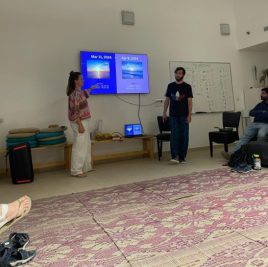by Sara Weissel, Spring 2024 Communications Intern

Since October 7th, the Israeli government has not allowed permit applications for Palestinians from the West Bank, meaning most participants of this semester are Jewish Israeli with a smaller number of native Arabic speakers and international students. A night bringing us all together to learn about our different histories sharply highlighted this reality for one of my fellow interns, Atman Errachid, who is Moroccan and Muslim. “It was the first time in my life that I felt like a minority… It was the first time experiencing the majority culture as a minority. In Morocco, Jews and Christian’s are minorities so everyone is interested in their customs and celebrations. But here, I was in their shoes, explaining to my friends about Eid.”
Two of our interns, Ebby and Rose, spoke to the group about Easter. As a Jewish American, Easter was a holiday I had previously only experienced through a lens of commercialization: it’s embarrassing to admit, but all I knew about it came from seeing chocolate bunnies and eggs at the grocery store. Ebby and Rose explained the timeline of Easter week, connecting it back to Lent, a period of 40 days in the Christian calendar marking the time Jesus spent fasting in the desert and resisting Satan’s temptations. Learning about Easter for the first time, I see it now as a time of reflection about sacrifice and love. Rose explained to us the connectedness of both: it is in our moments of immense pain and destitution that love is the strongest force.
Earlier in the semester, we had a Community Night dedicated to the beginning of Ramadan. As a group we made paper lanterns as decorations for our student lounge, and learned about the spiritual importance of Ramadan’s rituals. Those presenting that night talked about the fasting of Ramadan as a means to recognize one’s own gratefulness for abundance, and a time of renewed solidarity with those who go without. The practical reality of that message is of unfathomable reality now, as during this year’s fast the ongoing food crisis in Gaza only worsened.
Eid al-Fitr, I learned, is for celebration and family, but it is also a time to carry forward the lessons learned during Ramadan, to experience joy and express gratitude. It’s a theme that I feel is inherent in the holiday which I presented: Passover. Earlier that week, Institute Executive Director Dr. Tareq Abu Hamed shared with the staff that for him, Passover is about a time when faith persevered above all, how from faith springs hope. At a time when hostages remain still trapped in Gaza, their families having no knowledge of their whereabouts or condition, the story of the Exodus and redemption feels especially prescient, reminding us all of those missing from Seder tables and the continued need to keep fighting to bring them home.
For my presentation, we told the story of the Jews’ exodus from Egypt using mad-libs – a game I learned doesn’t really exist outside of the United States. In mad-libs, one player asks the audiences for different words based on their part of speech – if they are a noun, verb, adjective – filling in blanks left in a story with the suggested words. When the story is read out loud with the new words it no longer makes sense – in a hopefully funny way – so we corrected it together, revealing the actual story. For instance:
A long, long time ago, in a land not so far away, the sandy (adjective) Jews lived in a place called Rehovot (name of a place in Middle East) Mitzrayim.
And for a while, things were good for them. Tzvi (Name of an older Jewish man) and his coat of many saxophone (noun) was a high-ranking bureaucrat, and the Pharaoh was benevolent.
Having time dedicated to sharing cannot be overstated in its importance. My days here are soaked in informal exchange: At the Institute I am living, eating, cleaning, working, crying, and laughing with people I would have never had the chance to meet elsewhere. It’s the lifeblood of learning and practicing cooperation but having a space set aside each week propels the conversation and experiences we have each day. In this current moment, I am especially grateful for everyone who participated in the night – and really, for how everyone this semester has worked together to create such a wonderful, trusting and open community.

